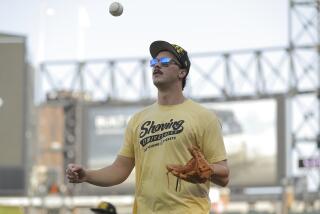Limelight Comes Late, but Senne Will Still Take It : A Hot Bat in Omaha Gets Ex-OCC Outfielder Drafted
- Share via
Until now, Mike Senne’s baseball career has moved quietly forward, with hardly anyone noticing, aside from the coaches who wrote his name on their lineup cards.
He’s been Mike Senne, the unheralded pitcher/shortstop from Orange Lutheran High School, a team that is usually among the county leaders in anonymity. “It was hard to get Mike exposure,” said John Malmquist, Orange Lutheran coach. “I guess a lot of people felt we weren’t much more than an intramural program.”
He’s been Mike Senne, the forgotten prospect on a 1984 Orange Coast College team that had pro scouts clamoring for signatures on contracts. Said Mike Mayne, Pirate coach: “In all the years I’ve coached, I’ve never had a player that good not get drafted. If he’s not a prospect, prospects don’t exist.”
He’s been Mike Senne, the overlooked outfielder at the University of Arizona. “He’s one of the most underrated players I’ve ever coached,” said Jerry Kindall, Arizona coach. “I just could not get him the recognition and attention he deserved.”
Until now.
Now, Senne finds himself in some rather well-known company. Pop quiz: What do Dave Winfield, Bob Horner, Sal Bando and Mike Senne have in common?
Answer: All were named the most valuable player in the College World Series.
In front of the ESPN cameras, Senne went 10 for 21 with two home runs and six RBIs to lead Arizona’s recent run to the championship in Omaha, Neb. After years of playing incognito, Senne finally found out there really was such a thing as a limelight. And he basked in it.
Senne’s confidence reached a peak during postseason play. He hit .514 in nine postseason games. “It just came about at the right time,” he said. “There was no problem with hitting during the past month. Everything they threw, I saw well. That makes baseball a lot easier.”
Senne finished the season with a .352 average, 11 homers and 80 RBIs. He had 21 doubles, 5 triples and scored 80 runs. He stole 32 bases in 37 attempts, and struck out only 31 times in 267 at-bats. He started 68 games in left field, which Kindall calls the most demanding outfield position in the Wildcats’ home park, and made only three errors.
But until an eventful series of games in Omaha, all of this went virtually unnoticed.
“At the end of a game, I’d look over the score book and see that Mike had a couple of hits, a stolen base, maybe drove in a couple runs,” Kindall said. “But somebody else will have done something more spectacular, and they’d get all the attention. I’ll say this, though--we could not have won without him.”
Senne went to Arizona after a year at Orange Coast, where Mayne decided that he was too valuable to keep in the dugout for three or four days between pitching appearances. Senne had spent his freshman year as a pitcher at Cal Lutheran College, an NAIA school in Thousand Oaks. Mayne convinced Senne that it would be to his advantage to be in the lineup every day, and suggested that he would look good in an Orange Coast uniform. Senne transferred, and Mayne made him his starting center fielder.
As a senior at Orange Lutheran, Senne had a 9-1 record with a 0.93 earned-run average and 90 strikeouts in 68 innings. But at Orange Coast, pitching became a part of his past. “I liked running and catching the ball in the outfield,” he said. “Pitching just kind of faded, and so did the desire to pitch.”
The Pirates won the South Coast Conference in 1984 with a 22-6 record (26-10 overall). Senne hit .317 with nine home runs and 49 RBIs. Mayne said he felt certain that Senne’s athletic ability--speed in particular--would warrant attention from pro scouts.
A few of his teammates received that kind of attention. Catcher Damon Berryhill, second baseman Jeff Gardner, third baseman Joe Kwolek and pitcher Jeff Osterode all signed professional contracts after the 1984 season.
But Senne wasn’t even drafted.
Mayne is still bewildered. His program has produced a number of major-league prospects, and he felt certain that Senne would be one of them.
“The things you can’t teach, Mike Senne has . . . in abundance,” Mayne said. “He’s one of the better talents I’ve ever coached. How can you get overlooked hitting third? He did the same things at our place that he did at Arizona, with the same results.
“Someone is not noticing something.”
Said Senne: “I was surprised, too, but I’m not bitter about it. I’m glad I’m getting recognized now.
“I love baseball. I just go out there and play as hard as I can and hope I get noticed.”
Professional baseball has at last taken notice. Senne was selected by the St. Louis Cardinals in the recent draft. As of Friday night, he had yet to talk with Cardinal representatives to discuss contract terms or possible minor league destinations.
There was a time when Senne might have wondered if he would ever have such a conversation. Getting to this point took perseverance and faith.
“I just didn’t worry about it,” he said. “I just had confidence that I had the ability, and that it would be noticed sooner or later. Obviously, it was later.”
More to Read
Go beyond the scoreboard
Get the latest on L.A.'s teams in the daily Sports Report newsletter.
You may occasionally receive promotional content from the Los Angeles Times.










